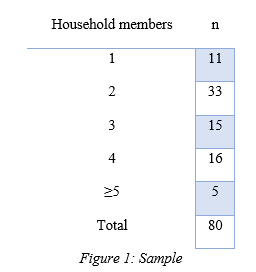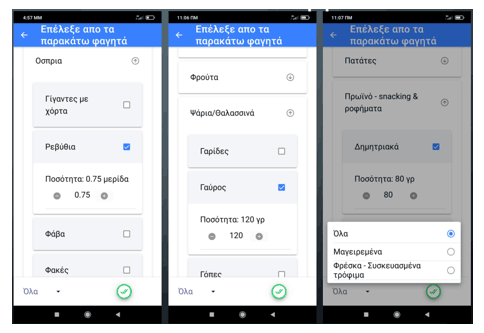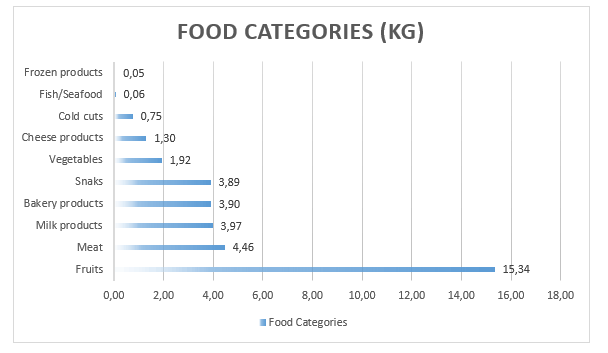by Prokopis K. Theodoridis, (Hellenic Open University), Theofanis V. Zacharatos and Vasiliki S. Boukouvala (University of Patras)
A new mobile app has been developed in Greece to track household food waste. The app is the first of its kind in the country and has the potential to significantly reduce food waste. The app allows users to easily record how much food they waste each day. The data collected by the app can then be used to identify areas where food waste is most prevalent and to develop strategies for reducing it. The data processing reveals that an average Greek household wastes around 400 portions of food annually, with an economic cost of €800–1,000. The app has the potential to raise awareness of the issue, empower consumers to reduce their food waste and help Greece achieve its sustainability goals.
Over the past few years, the food loss and waste (FLW) phenomenon and its negative economic, environmental and social effects has been considered one of the most important sustainability issues to be addressed at the global level. As FAO highlights, approximately one-third of the edible parts of food produced for human consumption globally was lost across the supply chain, which means around 1.3 billion tons of food loss and waste per year [1]. FLW reduction has been included among the 17 sustainable development goals of the UN’s 2030 agenda and specifically in target 12.3 that aims to: “halve per capita global FW [food waste] at the retail and consumer levels and reduce food losses along production and supply chains” by 2030 [L1].
The purpose of the research was to quantitatively record the food discarded by households in Greece through the use of a mobile phone app. This marks the first time in Greece that FW is collected and recorded electronically. The app was tested for a period of two months – from late December 2021 to late February 2022 – with a small number of households to evaluate its functionality and identify potential issues, omissions and other observations. After the necessary improvements, the app's usage was expanded to a broader audience in early March 2022. This stage can be considered as a “pilot” phase, with the rationale that the app, being introduced for the first time in Greece, should first operate with a relatively small number of users before being used by all consumers and households in Greece.
The app was distributed to 125 user-households, aiming for the best representation of households with varying member counts. Our approach can be characterised as purposive or judgemental sampling. We deliberately chose the sample to ensure that participants could best serve the purposes and questions of our research. Thus, one of the main criteria used was the number of members in a household, as well as the household's monthly income and the region of residence. The usage of the app by households was voluntary, and users could stop using it at any time. Out of the 125 user-households, we were ultimately able to gather complete data from only 80 households. The demographics of the households that used the app are presented in Figure 1.

Figure 1: Sample.
The period of registrations/recordings of the households we analysed was two-weeks, from March 9th 2022 to March 24th 2022. Figure 2 presents the digital environment of the mobile app. From the collection and processing of the data, the following interesting results emerge for the categories of households and their FW.

Figure 2:Sample from the digital environment of the application. Participating consumers could select from detailed lists of foods and cooked dishes and record daily precise quantities in kilograms/liters or portions that end up in their trash bins. The application as in the Greek language.
Comparison of households (average):
- Championing the category of waste are households of three individuals who discarded the largest quantities in 14 categories.
- Second are households with five or more members that discarded greater quantities in eight categories.
- Following are households of two individuals, which came first in the disposal of five categories.
- Lastly, households of one and four individuals are at the bottom, discarding larger quantities in two food categories.
Figure 3 shows the total quantities of fresh and packaged foods that end up in household bins in Greece.

Figure 3: Categories and quantities of food ending up in the household bins.
Finally, converting the quantities of FW that occur annually in an average Greek household into portions revealed that in Greece, every year, 400 servings of human-consumable food end up in household waste. Furthermore, the economic cost of this FW was estimated at €800–1,000 annually.
The data processing revealed significant results that highlight the importance of using digital methods for quantifying FW. Despite the app being used in a pilot stage, according to the authors' perspective, the published results can help tailor targeted interventions and educational campaigns to promote sustainable food consumption practices in Greece. Policy-makers and businesses can use this knowledge to develop effective strategies to reduce FW and foster a more sustainable food system.
This work is funded by the Greek Green Fund of the Ministry of Environment and Energy and especially under the call “Innovative actions with the citizens”.
Link:
[L1] https://sdgs.un.org/goals/goal12
Reference:
[1] J. Gustavsson et al., “Global food losses and food waste – extent, causes and prevention”, FAO, Rome, 2011.
Please contact:
Prokopis K. Theodoridis, Hellenic Open University, Greece
Theofanis V. Zacharatos, University of Patras, Greece
Vasiliki S. Boukouvala, University of Patras, Greece











